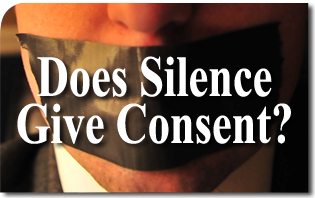""""[vc_column_text] Across the nation, thousands will remain silent for a day to raise awareness for those who are “silenced” or “too ashamed” to speak for themselves, a “persecuted” minority that wants to be accepted as normal. What group is this, you might ask? According to the Gay, Lesbian and Straight Education Network (GLSEN) that group is homosexuals. The silence being observed this Friday is in “honor” of those who are “discriminated” against or “bullied” for their “sexual orientation.”
Across the nation, thousands will remain silent for a day to raise awareness for those who are “silenced” or “too ashamed” to speak for themselves, a “persecuted” minority that wants to be accepted as normal. What group is this, you might ask? According to the Gay, Lesbian and Straight Education Network (GLSEN) that group is homosexuals. The silence being observed this Friday is in “honor” of those who are “discriminated” against or “bullied” for their “sexual orientation.”
Since 1996, some schools and universities across the country have been maintaining silence one day in April. The first ever of these events was held at the University of Virginia, and have since served to promote the homosexual movement to children in schools.
It is an attempt to bring people’s emotions into play on the debate about homosexuality and gender identity. However, there are two sides to this story.
The ones that are not represented in the homosexual movement’s narrative of “oppression” are those who have religious and logical motives for opposing unnatural vice. Take, for instance, Christian bakers who own a business that provides wedding cakes. When homosexuals come seeking a wedding cake for their “wedding,” the bakers refuse. For them, there is no doubt as to whether homosexuals can violate their beliefs, yet, they are silenced, persecuted and bullied with court rulings and lawsuits.
This has also been the case with photographers who are asked to take pictures of these same events, as well as dressmakers, florists and other businesses that are being forced to violate their consciences. If anything, this segment of society should have a day of silence honoring how they stand up to this tyrannical persecution.
It would appear that there is a different silence for those who oppose homosexuality. If the maxim “silence gives consent” stands true, does this mean that this silence is a tacit endorsement of the persecution of God fearing Americans? Why is there no day of silence for these, the truly persecuted and silenced? Does the homosexual movement’s silence give consent?[/vc_column_text][/vc_column][/vc_row]""""[vc_message message_box_color=”grey” icon_fontawesome=”fa fa-angle-right”]Taking a Principled not a Personal Stand
As practicing Catholics, we are filled with compassion and pray for those who struggle against violent temptation to sin, be it toward homosexual sin or otherwise.
We are conscious of the enormous difference between these individuals who struggle with their weaknesses and strive to overcome them and others who transform their sin into a reason for pride, and try to impose their lifestyle on society as a whole, in flagrant opposition to traditional Christian morality and natural law. However, we pray for them too.
According to the expression attributed to Saint Augustine, we “hate the sin but love the sinner.” And to love the sinner, as the same Doctor of the Church explains, is to wish for him the best we can possibly desire for ourselves, namely, “that he may love God with a perfect affection.” (St. Augustine, Of the Morals of the Catholic Church, no. 49, www.newadvent.org/fathers/1401.htm)[/vc_message][/vc_column][/vc_row]

